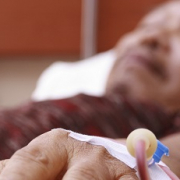Delivering results: the patient perspective
As genomic testing becomes more prevalent, the ability to deliver results sensitively is paramount; so what matters to your patients and their families?
Receiving genomic test results can be an incredibly stressful time for patients, and the importance of their delivery can’t be overestimated, writes Jillian Hastings Ward.
What’s in a diagnosis?
Genomic testing will soon find new diagnoses for thousands of people across the UK who are currently living with long-term health conditions. Some of these genomic diagnoses will be life changing. Sometimes a result may bring reassurance: is there now a name for a condition which was previously undiagnosed? Does it rule out more severe conditions? Does it help a patient gain access to appropriate care, additional treatment, or new support networks?
Yet finding a diagnosis – known as a ‘positive’ result – isn’t always a positive experience. For example, does this ‘positive’ result actually serve to limit someone’s life expectancy or ability to conceive? Does it have wider implications for other family members? Will it affect a couple’s decision about future children? Patients and their families need to receive their test results in a way that is sensitive to the context and implications.
Some genomic tests will not currently find a diagnosis. Genomics is still in its infancy and the sequencing technology used at present will continue to improve over the coming years. For now at least, large numbers of test results will be returned as ‘negative’ – no answer found – and it is vitally important that these results, too, are handled with great sensitivity.
Whatever the result, many families may be desperately worried about loved ones, and patients may already have waited years for a diagnosis, hoping to find out what lies in store for their future. Returning results in a timely and sensitive manner will therefore be essential if genomic medicine as a whole is to be considered a success.
Delivering new answers
Genomics England‘s national Participant Panel has extensive experience as users of the healthcare system, as patients and carers of patients with long-term and chronic conditions. We have distilled these experiences into some recommendations about how to deliver test results. These recommendations are applicable to the delivery of any genomic result, including those from the 100,000 Genomes Project, but also in the context of the new NHS Genomic Medicine Service which is starting to offer genomic sequencing to patients in England as part of routine NHS care. We want to share these recommendations as widely as possible among healthcare professionals, any of whom could find themselves working with results in the near future.
In all cases
Do consider the context of the test result, and its likely implications for the individual and their wider family, before making contact to deliver it.
Positive results: full or partial diagnosis
No surprises please! Some families have been waiting many years and may have significant anxiety about the results; the importance of your letter/email/call can’t be overstated.
- Do let someone know that you have news, and ask them when it would suit them to hear it. Empowering patients in this way will make them trust you, will make it easier for you to deliver difficult news, where applicable, and for them to really hear it.
- Don’t send results in letters (or emails) that arrive on a Friday or Saturday without any way of contacting a clinician until the following week – therein lies a weekend from hell!
- Don’t leave people waiting a long time, once they know you have an answer for them. Sending a clinic appointment out of the blue for weeks or months ahead will set alarm bells ringing, and patients may not be able to resist the temptation to contact you immediately in search of news.
- Most patients would prefer a face to face conversation; all appreciate the ability to ask questions at the time.
- Do include the technical details of the test/diagnosis/result, as well as the headlines. Some patients will wish to investigate further on their own or will be asked for this information by subsequent researchers. For genetic results this includes the precise location of the gene variant that has been identified as pathogenic, as well as any gene panels that have been tested.
- Do provide a clear route for anyone to ask follow-up questions later: provide direct contact details for a real person who will be able to advise, once the dust has settled from the original impact and the patient has time to think it over.
- Do signpost further sources of help or advice, including patient groups and charities, who may have more information than you about ultra-rare conditions, onward lifestyle choices and non-medical sources of support.
Negative results: nothing found at this time
These are equally important as positive results and must be handled equally sensitively.
- In many cases these could suitably be delivered in a letter rather than in person but should always include direct contact details for a real person who can respond to questions. These may occur to patients immediately, or many months/years ahead.
- It may be helpful to explain what the test was looking for: patients may want to know what has been ruled out, to inform their own decisions about what to do next.
- It is also helpful to explain that patients’ data may be held in perpetuity for research in the future (if they agree to this), and if that research brings new diagnoses to light, they will be informed.
Building new trust relationships
Genomic medicine is a new world, where patients and clinicians will have to work together to make sense of the sequence data that comes back from the lab. None of us has all the answers so collaborative working is key, especially where patients have been living with long-term conditions and have become ‘experts by experience’. By delivering results with kindness, taking the context and implications into account, healthcare professionals can build up a trust relationship with patients that will bring new rewards in the future.
In summary: tread carefully, and your patients will really appreciate it. Thank you!
Jillian is the Chair of the Participant Panel for the 100,000 Genomes Project, representing the interests of project participants in decisions that are made about the use of their genomes and associated healthcare data. She joined the project in search of answers for her severely disabled son. Her background is in consultancy and the civil service.
This article is based on a report prepared in spring 2018 with colleagues from Genomics England’s national Participant Panel for the 100,000 Genomes Project – thanks to Alex Brownlee, Alison Fox, Anthony Locke, Belinda Laubi, Dave McCormick, Dominique Stephens, Hannah Podd, Karen Carter, Kate Burke and Rebecca Middleton.
–









